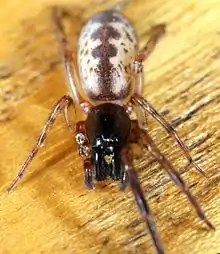| Snake-back spider | |
|---|---|
 | |
| Scientific classification | |
| Domain: | Eukaryota |
| Kingdom: | Animalia |
| Phylum: | Arthropoda |
| Subphylum: | Chelicerata |
| Class: | Arachnida |
| Order: | Araneae |
| Infraorder: | Araneomorphae |
| Family: | Segestriidae |
| Genus: | Segestria |
| Species: | S. senoculata |
| Binomial name | |
| Segestria senoculata | |
| Synonyms | |
| |
Segestria senoculata, sometimes known as the snake-back spider, is a species of spider belonging to the family Segestriidae. It has a Palearctic distribution.
The common names of this species (which has a body length of around 9 mm) refer to a row of black spots along the back of the grey abdomen which are thought to resemble the pattern found on some snakes. However, on some specimens these markings fuse to form a solid band. The carapace is shiny dark brown and elongated and the legs are pale brown with darker ringing.
As with other members of this family, this spider makes a tubular web in a crevice and darts out to catch prey which crosses trip lines which fan out from the tube's entrance.
Segestria senoculata is the only recorded prey for the Pepsid spider wasp Dipogon subintermedius in Great Britain.[1]
References
- Preston-Mafham, Ken (1998). Spiders: Compact Study Guide and Identifier. Angus Books. ISBN 978-1-904594-93-2.
- Platnick, Norman I. (2008): The world spider catalog, version 8.5. American Museum of Natural History.
External links
- Picture
- Known world distribution
- www.habitas.org.uk/invertebrateireland
- The checklist of Lithuanian spiders (Arachnida: Araneae). Marija Biteniekytė and Vygandas Rėlys, Biologija, 2011, Vol. 57, No. 4, pages 148–158, doi:10.6001/biologija.v57i4.1926